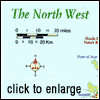|
The North Coast

Commencing on the A836, the road that runs across the
top of the Scottish mainland, Strathnaver Museum in Bettyhill commemorates the drastic
effects of the Highland Clearances of Caithness and Sutherland.
The Invernaver National Nature Reserve between the
mouths of the Rivers Borgie and Naver on the west side of Bettyhill is one of the
most important botanical sites in Scotland with a wide variety of lime and acid loving
species such as crowberry, mountain avens, moss campion and bearberry.
The village of Tongue largely exists on a hairpin
bend as the road descends to the Kyle of Tongue with only a few cottages, a couple
of hotels and a garage. The garage occasionally runs out of certain types of fuel
so stock up wherever you can. Atop the hill behind town is Castle Varrich, a former
Norse stronghold now in ruins.
A walk down to Scullomie Pier, approximately 3 miles
(5km) east of Tongue, leads to one of the points where crofters were put on boats
during the Clearances. A lonely pile of rocks forming a desolate harbour is all that
remains.
The Kyle of Tongue is a sea loch below the village,
traversed by a 2-lane causeway. There are stopping places along the causeway that
provide good views of Ben Loyal behind the village.
From here the road improves towards Durness but soon
reduces again to a single track around Loch Eriboll. Dramatic outlooks over the deep
channel of Loch Eriboll can be enjoyed from several stopping places. At the cessation
of World War II, German U-Boats sailed up Loch Eriboll to offer their surrender.
There are fish farms sheltering near the bays and
coves along this coastline, and a recent and novel method of warding off salmon-destroying
seals has been devised. A life-sized fibre-glass killer whale called Wally was put
in the water near the fish tanks which has proved 100 per cent effective. The seals
that took at least 200 fish per week now take none.
Around Durness
If the weather holds, Durness and this north-west
corner is one of the most special places in Scotland. If it rains, visitors crowd
into Durness's steamy cafes to sit for hours waiting on a break in the weather.
Smoo Cave is a useful excursion on such a day, reached
by descending a long wooden staircase to the beach where a limestone cavern is entered,
as big as an aeroplane hanger. The inner caves are accessible by rubber raft for
a small charge to observe the dramatic 80ft (24m) waterfall in the rear cavern called
Allt Smoo.
Another diversion near town is Balnakeil Craft Village,
formerly a MOD Early Warning Station and now taken over by a group of craft-workers
and turned into a kind of alternative holiday camp with various shops selling candles,
paintings, woodwork and pottery.
Durness is best enjoyed for its open headlands and
long, broad beaches. From early spring until June, colonies of puffins can be seen
around Faraid Head. Ask the ranger in the Durness Tourist Information outpost for
directions to the colony. The walks along the headlands are generally safe but care
should be taken with small children near the steep grassy slopes. On Wednesdays,
the RAF carry out bombing raids on a tiny island 2 miles (3km) north of the mainland
using live ammunition. The 9-hole golf course at Durness, set behind the ancient
Balnakeil Church, is the most northern course on the Scottish mainland.
Cape Wrath
The trip to Cape Wrath is very weather dependent with
a short ferry crossing from the Keoldale slipway, 1 mile or so south of Durness.
The small ferry boat links up with a minibus on the other side to cover the remaining
10 miles (16km) to the Cape. From the lighthouse on a clear day, you can see the
Orkneys as well as the Outer Hebrides. Several varieties of sea birds are usually
present so take binoculars.
It is possible to walk to beautiful Sandwood Bay from
Cape Wrath but it is a fair hike and, in some places, rather tedious. It is much
easier to approach it from Kinlochbervie, off the A838 where you can drive to Balchrick,
then walk the remaining 4 or 5 miles (6 or 8km) staying near to the coast.
Handa Island
Further south beyond Laxford Bridge is a turning for
Tarbert where there is a site of Special Scientific Interest on the island of Handa.
A boat runs from Tarbert to the island where you can take a three hour walk following
paths along the sandstone cliffs to observe more than 100,000 nesting sea birds including
puffin, fulmar, shag and guillemot. It is a good idea to bring a flask and sandwiches
as there are no facilities on the island.
Around Lochinver
At Kylestrom there are hotels and a boat service that
runs from Unapool across the loch to Eas a' Chaul Aulinn, Britain's highest waterfall
dropping 658ft (201m). En-route you may see deer, seals and if particularly lucky,
a golden eagle so, once again, pack binoculars.
 From Newton, basically the next group of houses south, you
can continue on the main A894 for a smooth run into Lochinver or follow the more
spectacular route around the coast, the B689. The Old Man of Stoer, a famous sea
stack, can be reached from the Stoer Lighthouse but stick to the coast or you will
end up wading through boggy land. From Newton, basically the next group of houses south, you
can continue on the main A894 for a smooth run into Lochinver or follow the more
spectacular route around the coast, the B689. The Old Man of Stoer, a famous sea
stack, can be reached from the Stoer Lighthouse but stick to the coast or you will
end up wading through boggy land.
East beyond the meeting point of the A894 and the
A837 stands Ardvreck Castle, a ruin perched precariously on a spit of the north shore
of Loch Assynt. It can be a soggy, cow-pat infested walk from the road over to the
castle and the remaining slabs of sandstone do not appear very safe.
Lochinver
The village of Lochinver straddles the River Inver
where it pours into Loch Inver. The main deviation from car-touring is boat trips
to view colonies of cormorants, shags and seals perched or preening on the many little
islands off the coast. In the right season you may see a whale or two.
Boat trips can be chartered formally or simply by
knocking on the door of one of the owners such as Ewen Sharp who owns the Lunga Boat,
a converted lifeboat. If it is a nice evening and he is not doing anything else,
he will take you out. From the loch you can best appreciate the magnificent setting
of the village with the bowler-hat shaped Suilven peaking over lower hills at 2,399ft
(732m).
There is a visitor centre in the village that describes
the lives of the people and the land of Assynt Parish. Lochinver Village Hall puts
on a 'Summer Cinema', a rustic affair but worth attending for the novelty. Following
the road round the north side of the loch leads to Baddidarroch and the factory of
Highland Stoneware Pottery where some of the finest tableware is turned out and hand-painted
right before your eyes.
For nourishment, the Lochinver Larder and Riverside
Bistro is surprisingly refined with excellent wholefood and fish dishes as well as
sweets that ably compliment this heavenly setting. The harbour area is less cultivated,
and the nearby hotel serves freshly-caught fish.
The Summer Isles
Continue west and south of Lochinver for a spectacular
drive with views of Suilven and Canisp with Stac Pollaidh in the distance at 2,009ft
(613m). Beyond, if you care to drive this far, is the Summer Isles and the village
of Achiltibuie, worth a visit for The Hydroponicum, one of the world's most surprising
indoor gardens where bananas, figs and lemons are cultivated in a soil free environment.
Achiltibuie also boasts one of the area's finest hotels, the Summer Isles, especially
renowned for its cuisine.
|


